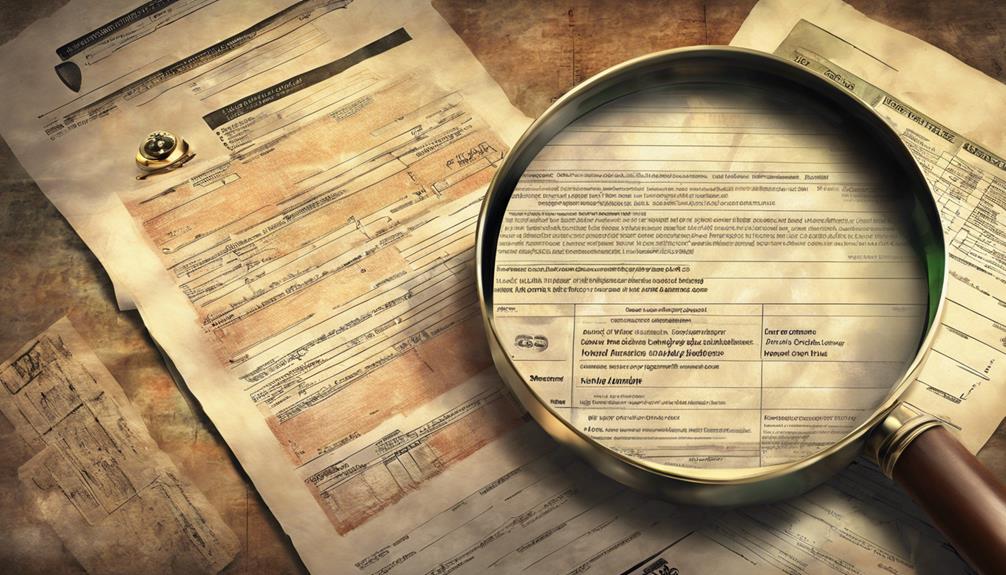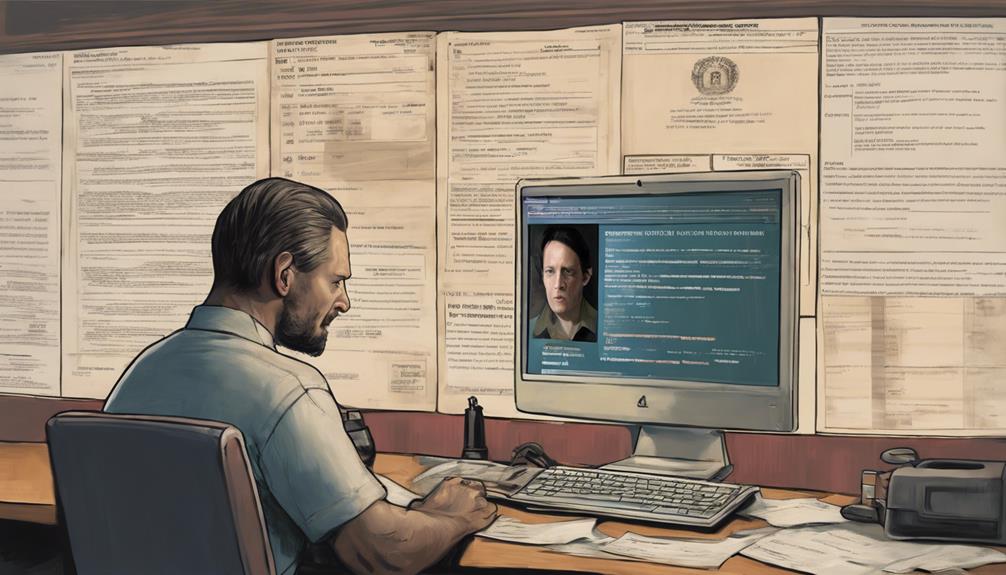Violations, like traffic tickets and misdemeanors, can show up on background checks. The presence of these violations depends on the type of check and the seriousness of the offense. Typically, criminal history checks encompass such violations. Employers often use these checks to evaluate candidates thoroughly. However, the inclusion of violations can vary, so understanding the specific background check scope is essential. Be aware that different types of violations might have different impacts on background screening results.
Key Takeaways
- Criminal violations typically appear on background checks.
- Speeding tickets may not always show on standard background checks.
- Some violations can impact criminal records and driving histories separately.
- Defensive driving courses can mitigate the impact of certain violations.
- Consult legal advice to understand how violations may affect background checks.
Types of Background Checks in Texas

Among the different types of background checks in Texas, criminal records checks are an important component that includes convictions, arrests, court records, and warrants. Employers often conduct these checks to guarantee the safety and security of their workplace and clients. By reviewing an individual's criminal history, employers can make informed decisions regarding hiring and mitigating potential risks.
Additionally, employment history verification is another significant aspect of Texas background checks. This process confirms the accuracy of past positions held by the individual and the durations of their service. Education verification is also crucial in validating degrees, diplomas, and certifications claimed by the applicant.
Moreover, credit history checks may be performed for roles that involve financial responsibilities, evaluating the candidate's creditworthiness. Overall, various types of background checks in Texas, including employment, tenant screening, and personal background checks, serve as valuable tools for employers to make informed hiring decisions and maintain a secure work environment.
Records Employers May Check
Employers commonly check criminal records and verify employment history when conducting background checks. Understanding the types of records that may be reviewed allows candidates to prepare effectively for potential findings.
Being aware of what employers may check can help candidates navigate the background check process with confidence.
Criminal Record Check
When conducting background checks, organizations typically review criminal records to gain insight into a candidate's legal history and suitability for a position. Employers may investigate various aspects of a candidate's criminal record, including arrest records, conviction records, and juvenile records if relevant. Here is a breakdown of the types of records employers may check:
| Type of Record | Description | Relevance |
|---|---|---|
| Arrest Records | Capture instances of being taken into custody but do not necessarily indicate guilt or conviction | Assess behavior and potential risks |
| Conviction Records | Reflect misdemeanors and felonies with legal convictions | Evaluate integrity and adherence to laws |
| Juvenile Records | Include offenses committed as a minor and may be pertinent for roles involving minors | Determine suitability for positions involving youth |
Understanding the scope of background checks empowers candidates to anticipate potential findings and prepare adequately for the screening process. By being aware of the information that may surface in a criminal record check, candidates can address any concerns or discrepancies proactively.
Employment History Verification
An important aspect of background checks involves validating candidates' employment history to assess their previous work experience and qualifications for a position. Employers commonly review past employment records to confirm the accuracy of a candidate's resume and to evaluate their job performance in previous roles.
This validation process helps employers make informed hiring decisions and secures that candidates possess the necessary skills and experience for the job.
Employers may also examine reasons for departing previous positions, job titles held, responsibilities, and dates of employment. By scrutinizing a candidate's employment history, employers can gain insight into their work ethic, reliability, and ability to succeed in a new role.
Additionally, validating past employment can help identify any discrepancies or red flags that may arise during the hiring process.
Understanding the information that employers may seek during employment history verification can assist candidates in preparing for background checks and addressing any concerns that may arise. By being aware of the records employers may review, candidates can proactively address any issues and present themselves in the best light possible during the hiring process.
Rights and Obligations in Texas

Employers in Texas must first receive written consent from candidates before initiating background checks. This is an essential right that guarantees transparency and privacy.
Candidates also hold the right to dispute any inaccuracies found in their background checks. This safeguards their credibility and reputation.
Additionally, employers in Texas are obligated to provide explanations for any adverse decisions made based on background check findings. This promotes fairness and accountability in the hiring process.
Consent for Background Checks
Candidates in Texas must provide written agreement before employers conduct background checks. This requirement is mandated by Texas law to protect the privacy and rights of individuals.
When considering agreement for background checks, it's crucial to understand the following emotional points:
- Trust: Candidates deserve transparency and trust from employers when granting agreement for background checks.
- Empowerment: Providing agreement empowers candidates to take control of their personal information and background check process.
- Respect: Employers showing respect by seeking agreement fosters a positive and respectful relationship with candidates.
- Fairness: Agreement ensures fairness in the background check process, benefiting both candidates and employers.
- Accountability: By obtaining agreement, employers uphold their accountability to handle background check information responsibly and ethically.
This mutual understanding of agreement not only aligns with Texas law but also sets the foundation for a fair and respectful background check process for all parties involved.
Disputing Inaccurate Information
In Texas, individuals possess the right to challenge any incorrect information identified in their background checks. When discrepancies are found in their criminal background checks, candidates have the opportunity to contest the accuracy of the background information.
Employers must handle these disputes with transparency, allowing candidates to provide evidence supporting their claims of inaccuracies. It's the responsibility of employers to thoroughly investigate and rectify any inaccuracies found in background check reports.
Adverse Decision Explanations
Clear explanations for adverse decisions based on background checks are essential in maintaining transparency and trust between parties in the hiring process. Employers in Texas are obligated to provide candidates with these explanations, allowing candidates to understand why they weren't selected for a job due to their background check results.
This transparency also enables candidates to address any inaccuracies or mitigating circumstances related to their background check findings. By following guidelines to ensure fairness and prevent discrimination, employers can make informed adverse decisions while upholding ethical standards.
Providing clear explanations for adverse decisions not only fulfills legal obligations but also fosters a sense of accountability and integrity in the hiring process.
- Transparency in adverse decision-making builds trust between employers and candidates.
- Understanding the reasons behind adverse decisions enables candidates to take appropriate action.
- Clear explanations help prevent misunderstandings and promote fairness in the hiring process.
- Providing insights into background check results facilitates open communication and resolution of any discrepancies.
- Upholding transparency in adverse decision explanations showcases a commitment to ethical practices in recruitment.
Texas Background Checks: Scope & Limitations
Texas background checks have specific limitations and scope that regulate the reporting of negative information. Criminal convictions are subject to a seven-year reporting rule in Texas, meaning that certain offenses may not appear on background checks after this period.
However, there are exceptions for high-paying positions where salary information can be included in background checks. Furthermore, Houston adheres to Ban the Box laws, which delay inquiries about an applicant's criminal history until later in the hiring process.
It's essential to note that criminal convictions can potentially appear indefinitely on background checks in Texas, depending on the severity of the offense. Additionally, there are restrictions on using credit information for background checks in the state, emphasizing the importance of understanding the specific regulations governing background checks in Texas to ensure compliance and fairness in the hiring process.
Special Considerations for Houston Industries

Industries in Houston, such as energy and healthcare, often necessitate more extensive background checks due to the nature of their operations. Employers in these sectors must adhere to specific criminal background check requirements to guarantee the safety and security of their workplaces.
When it comes to background checks in Houston, there are some special considerations for industries in the area:
- Sensitive Positions: Certain industries, particularly those in healthcare and security, may have heightened background check requirements due to the sensitive nature of the work involved.
- Regulatory Compliance: Industries like energy often require background checks that go beyond criminal history to include checks on educational background and professional licenses.
- Sealed Records: Employers in Houston must handle sealed and expunged records appropriately to comply with legal regulations.
- Public Sector: Public sector jobs, especially security-related positions, may have more stringent background check requirements in Houston.
- Exclusions: Some minor infractions, such as juvenile records and minor traffic violations, may not necessarily appear in background checks in Houston.
AI Usage
Some attorneys in New York, NY, are transparent about utilizing artificial intelligence in their legal practices. When it comes to criminal defense attorneys like Attilio A. DOro, AI usage can play a significant role in analyzing violations and misdemeanors that may appear on background checks. By leveraging AI technology, attorneys can efficiently sift through vast amounts of data to identify relevant information regarding their clients' legal history.
AI usage in legal practices can enable attorneys like Jeffery L. Greco to provide accurate insights into how violations may impact background checks. This advanced technology allows for a more thorough examination of the circumstances surrounding a violation, aiding attorneys in crafting effective defense strategies.
Moreover, with the guidance of attorneys like George Peter Conway, individuals can better understand the distinctions between violations, misdemeanors, and felonies, helping them navigate the complexities of their legal situations with the support of AI-driven analysis.
Nature of Speeding Tickets in Texas

Speeding tickets in Texas are typically classified as civil infractions, distinct from criminal offenses. These tickets are considered minor violations that result in fines rather than criminal charges. When it comes to background checks, dismissed speeding tickets usually don't show up on criminal records, providing some relief to individuals who've had their tickets resolved through legal means.
However, it's important to note that speeding tickets can be categorized as class C misdemeanors in Texas, which might have implications for individuals with multiple violations.
- Speeding tickets in Texas can lead to costly fines and increased insurance rates.
- The classification of speeding tickets as class C misdemeanors can have legal repercussions.
- Dismissed speeding tickets generally don't appear on criminal background checks.
- Multiple speeding violations can result in license suspension, affecting daily life.
- Attending defensive driving courses can sometimes lead to the dismissal of speeding tickets, offering a chance at redemption.
Effect of Defensive Driving Courses
When individuals attend defensive driving courses in Texas, they have the opportunity to potentially have their speeding tickets dismissed, providing a chance to avoid points on their driving record and prevent insurance rate increases.
While dismissed speeding tickets may not typically show up on criminal background checks since they're civil infractions in Texas, they could still appear on driving records obtained from the Department of Motor Vehicles (DMV).
Defensive driving courses serve as a common option for first-time offenders dealing with speeding violations, offering a way to address the issue proactively.
It's important for individuals to seek legal advice to fully grasp the implications of attending these courses on their driving records and insurance rates.
Legal Implications of Speeding Tickets in Texas

Attending a defensive driving course in Texas can have significant legal implications for individuals issued speeding tickets. In Texas, speeding tickets are classified as civil infractions, not criminal offenses. Dismissed speeding tickets may not typically appear on criminal background checks but could show up on driving records obtained from the DMV.
Multiple speeding violations in Texas can lead to license suspension and increased insurance rates. By attending a defensive driving course, individuals may have their speeding ticket dismissed, potentially preventing insurance rate hikes.
Seeking legal advice can also help individuals navigate the legal implications and consequences of speeding tickets in Texas.
- The fear of facing license suspension can be overwhelming for individuals with multiple speeding violations.
- Dismissed speeding tickets can provide relief but may still impact driving records.
- The financial burden of increased insurance rates due to speeding tickets can be stressful.
- Legal advice can offer clarity and guidance in dealing with the aftermath of receiving a speeding ticket.
- The uncertainty of how speeding tickets may affect future opportunities can cause anxiety for individuals.
Options for Dealing With Speeding Tickets
Speeding ticket dismissal through defensive driving courses can be a beneficial option for individuals facing fines and potential license suspension.
Nevertheless, it's crucial to note that even dismissed speeding tickets can still impact driving records obtained from the DMV.
Seeking legal advice, such as hiring a traffic lawyer, can assist individuals in navigating the complexities of speeding ticket defenses and potential legal ramifications.
Speeding Ticket Dismissal
How can drivers effectively handle the dismissal of speeding tickets to avoid negative implications on their driving records and insurance rates? Dismissed speeding tickets may not always be completely erased from driving records, so it's crucial to consider the following options:
- Explore attending a defensive driving course to potentially have the speeding ticket dismissed.
- Understand that dismissed speeding tickets may still show up on driving records obtained from the DMV.
- Completing a defensive driving course can help prevent insurance rate increases and points on your driving record.
- Keep in mind that in Texas, speeding tickets can lead to fines, court appearances, and even license suspension with multiple violations.
- Seek legal advice to fully comprehend the consequences of speeding tickets and make informed decisions on how to handle them.
Impact on Driving Records
Drivers have several options available to manage the impact of speeding tickets on their driving records. Speeding tickets, classified as class C misdemeanors in Texas, can greatly affect driving records.
Defensive driving courses offer one solution, as completion can lead to the dismissal of speeding tickets, preventing points from appearing on driving records. However, even if a speeding ticket is dismissed, it may still show up on driving records obtained from the DMV, even if not on criminal background checks.
Accumulating multiple speeding violations can result in severe consequences such as license suspension and increased insurance rates. Hence, seeking legal advice and fully understanding the implications of speeding tickets are vital in decision-making to protect one's driving record and avoid potential license suspension.
It's essential for drivers to be proactive in addressing speeding tickets to maintain a clean driving record and avoid long-term negative impacts.
Frequently Asked Questions
What Could Ruin a Background Check?
Various factors can ruin a background check, including criminal convictions, negative credit history, false educational claims, discrepancies in employment history, and inaccurate personal information. Violations, misdemeanors, and felonies could also negatively impact background checks.
What Would a Background Check on You Show?
A background check on someone typically reveals arrest records, conviction details, driving violations like speeding tickets or DUIs, civil infractions such as parking tickets, and any reported violations, providing a thorough legal history overview.
What Is a Red Flag on a Background Check?
In the maze of background checks, red flags wave ominously, signaling potential trouble. Employers scrutinize criminal records, employment gaps, and financial mishaps as warning signs. These flags, unique to each role, guide hiring decisions.
Do Arrests Show up on Background Checks in Texas?
Arrests can appear on background checks in Texas, potentially impacting hiring decisions. Even without convictions, individuals should be aware that arrest records might be included in reports, prompting the need for preparation and explanation.
What Kind of Violations Would Show Up on a Background Check for Section 8 Housing?
When applying for Section 8 housing, the background check execution will primarily focus on identifying any criminal violations such as drug-related offenses, violent crimes, and fraud. Any history of eviction or housing assistance fraud will also be flagged during the section 8 background checks execution.
Conclusion
To sum up, it's safe to say that violations do indeed appear on background checks in Texas. So, if you were planning on hiding that little speeding ticket from last year, you might want to think again.
Remember, the truth always has a funny way of catching up with you – just like those flashing red and blue lights in your rearview mirror. Drive safe, folks!









